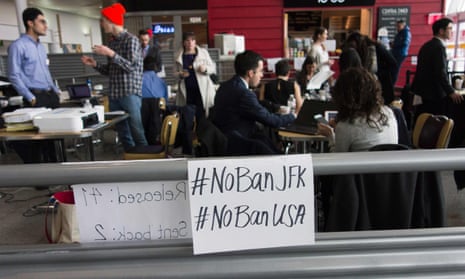There was confusion on Monday about whether or not anyone remained in detention at airports following the chaotic scenes that resulted from Donald Trump’s Friday executive order banning travel from seven Muslim-majority countries.
An advocacy group at JFK airport in New York City said that there had been additional detentions Monday. The homeland security department did not immediately reply to a query about the reported new detentions.
Dozens of travelers were detained at US airports over the weekend as US border agents put the policy into effect. Some travelers were detained for hours, some were refused entry to the US and put on outgoing planes, and some green card holders – permanent US residents – were reportedly pressured to give up their documents.
US travel ban - a brief guide
The executive order signed by Donald Trump suspends the entire US refugee admissions system, already one of the most rigorous in the world, for 120 days. It also suspends the Syrian refugee program indefinitely, and bans entry to the US to people from seven majority-Muslim countries – Iran, Iraq, Libya, Somalia, Sudan, Syria and Yemen – for 90 days. The order has prompted a series of legal challenges, while thousands of Americans have protested outside airports and courthouses in solidarity with Muslims and migrants.
All of the detention cases from the weekend had been “processed”, a homeland security spokesperson told the Guardian on Monday. “As of last night, Customs and Border Patrol had processed all cases of individuals who were initially affected by the order at airports around the country,” said the spokesperson in an email. “Not sure if there are additional folks this a.m.”
At New York’s JFK airport, where protests had dissipated on Monday, a sign at an area set up by human rights groups at terminal four this morning said: “CONFIRMED: Released: 41, Sent back: 2, Detained: 1.”
That one detainee was later released, according to Sara Lind, a volunteer legal aide there. She said the detainee did not want their identity or nationality made public.
“We’re not seeing as much action here because people are still not being allowed to board flights from wherever they are trying to come from,” said Lind.
“We seeing a sharp decrease in the number of detainees,” said Camille Mackler, with the New York Immigration Coalition. “We haven’t seen anyone come in in many hours. We believe that’s because people are not being allowed to board flights.”
Lind later said that she had heard reports of two further people being detained, one of whom she said was Iraqi.
Mackler stressed that human rights groups’ numbers were inexact, with information being gleaned from elected officials, not directly from immigration authorities. “We suspect ... the number who are not allowed to board is far larger than the 109 number the government has given us.”
Multiple advocacy groups said they were encountering difficulties in getting information from the government about potential detainees.
“It’s hard to get the fixed number because the Border Patrol still won’t release all the names to the lawyers,” said Henrike Dessaules of the International Refugee Assistance Project.
A spokesperson for the American Civil Liberties Union said the organization was seeking the same information, to no avail.
The order banned entry to the US of travelers from seven Muslim-majority countries – Iran, Iraq, Libya, Somalia, Sudan, Syria and Yemen – for 90 days.
